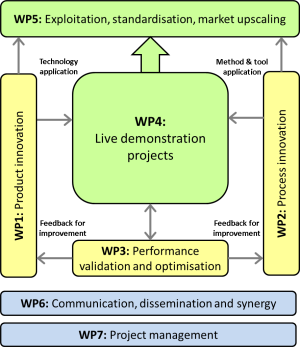Work Programme
The P2ENDURE is an empirical R&D (Research & Development) project that covers a 4-year duration with the following main activities:
- Year 1: refine, optimize, integrate and test prefab deep renovation solutions; develop detailed guidelines for BIM modelling and implementation of deep renovation in real projects.
- Year 2: prepare retrofitting activities in demonstration projects according to implementation guidelines; complete BIM modelling based on DfMA principles (Design for Manufacturing and Assembly).
- Year 3: execute retrofitting activities in demonstration projects according to guidelines; perform on-site 3D printing and assembly along with self-inspection to prevent quality and performance gap between design/prefabrication and realization.
- Year 4: monitor real performance of the buildings after deep renovation and develop a market plan; present and validate business and commercialization plans with the stakeholders; prepare replication projects in various European geo-clusters.
Overall Structure of the work plan

P2ENDURE collaborative research project covers a total duration of four years (48 months). The project is organised in 7 Work Packages (WPs) that fully support the practical and empirical project approach.
- WP1 ‘Product innovation’ consolidates the state-of-the-art innovative products of Plau-and-Play (PnP) prefab components, and draws a plan to optimise and integrate these components depending on the deep renovation typologies. Taking the focus on practical impacts and exploitation potentials, P2ENDURE does not intend to invent new products. The key targeted outcome from WP1 is a set of solutions ready for implementation in the live demonstration projects.
- WP2 ‘Process innovation’ generates practical guidelines to understand, configure and implement the ‘4M modular deep renovation processes’ (Mapping – Modelling – Making – Monitoring) introduced in P2ENDURE. At the same time, WP2 sets up the supporting methods and tools, including: BIM parametric modeller and virtual demonstration (simulation) platform; analysis models and software tool for condition assessment and asset management at deep renovation; e-Marketplace platform for supply-chain integration; and local factory organisation for district-scale deep renovation.
- WP3 ‘Performance validation and optimisation’ forms the primary thrust to P2ENDURE’s evidence-based innovation. WP3 carries the mission to collect and present evidence that the promoted innovative products, processes, methods and tools. Only with such credible evidence, the market acceptance will significantly be extended. The evidence must be grounded in real practice; and therefore, WP3 directly observes and reports the activities in live demonstration projects.
- WP4 ‘Live demonstration projects’ is the heart of P2ENDURE project. In this Work Package (WP), the TRL8+ (Technical Readiness Level) innovations are brought to practice and tested directly by the stakeholders of deep renovation projects. More than 10 real projects will be performed. Each project addresses one or more challenges of deep renovation that should be solved using PnP prefab systems. The targeted achievements are threefold: realising and measuring the success of the pilot deep renovation cases; facilitating cross-learning between different projects and geo-clusters, and securing the broad replication potential at EU level.
- WP5 ‘Exploitation', standardisation and market upscaling’ crystallises the technical achievements and develops viable strategies to pave the ways towards commercialization and to ensure the deep and wide impacts at EU level. This Work Package (WP) will deliver generic exploitation, business and replication plans that are eligible for adjustments and implementations in different market networks. Standardisation becomes an integral part of market upscaling as EU certified / acknowledged / recommended solutions can be taken up in public procurements more easily. The main vehicle in WP5 to reach this aim is the Technology Commercialization Platform (TCP) which gathers and empowers stakeholders in two mainstreams: stakeholders who are directly involved with the demonstration cases (i.e. project owners, contractors, local municipalities), and other stakeholders with commitment for replications and/or market upscaling (i.e. large manufacturers with global/EU market networks; other clients/municipalities with interest for replication).
- WP6 ‘Communication, dissemination and synergy’ is responsible for the outreach activities of the P2ENDURE project. This Work Package (WP) will reach both practitioners and academia while keeping the focus on a successful market upscaling of deep renovation solutions through enlarging the body-of-knowledge and embedding the empirical knowledge into technology developments. Targeted dissemination and valorisation activities will be directed towards the Technology Commercialization Platform (TCP), conducted simultaneously with broad communication activities to reach the EU public at large.
- WP7 ‘Project management’ is responsible for the coordination of all technical, exploitation and administrative processes within the P2ENDURE collaborative innovation action. For ensuring the highest impact, the coordination roles are shared among the Project Coordinator, Technical Coordinator, and Exploitation Coordinator. These 3 coordinators and the remaining WP leaders work closely together in the Steering Committee.